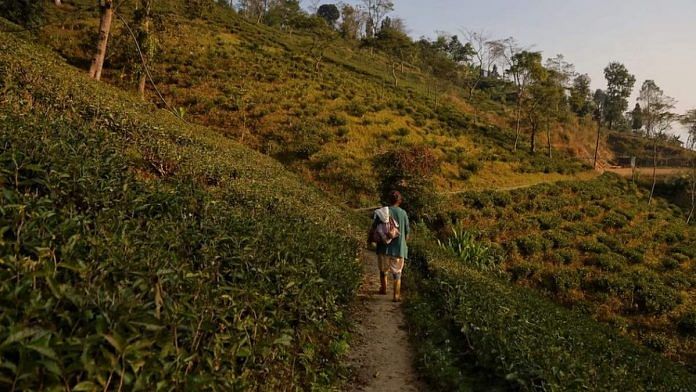The North Bengal tea industry, spread across 100,000 acres, is in dire straits. Given that it employs more than 3 lakh workers, predominantly women, and serves as a crucial source of exports, resolving this crisis is of paramount importance for both the state and the Union governments.
Worst hit among these estates are Darjeeling’s 87 fabled tea gardens, most of which are reportedly on the verge of closure. As a tea planter living in Darjeeling’s heritage Selim Hill Tea Garden, I can attest to this.
However, prices have remained stubbornly stagnant. What explains this price abnormality is the infiltration of Nepal tea into India and its widespread misrepresentation globally as ‘Darjeeling tea’, which has accelerated dramatically after the 2017 shutdown in production in the wake of the Gorkhaland strikes.
As things stand, Darjeeling’s octogenarian tea planters are out of ideas. Since 2017, they have faced huge losses every year, all the while hoping harvest will be better the following year or that the international market will improve.
However, until the core conditions for this stagnancy are addressed, the crisis will not subside. The Union government, whose cabinet ministers rightfully championed Darjeeling tea during the G20 summit and on overseas visits, needs to intervene and take radical steps.
Also Read: Darjeeling tea estates are now luxury tourism hotspots. Taj Hotels offering leaf picking, spa
Tackling pretenders the French way
In June last year, the Parliamentary Standing Committee on Commerce took cognisance of the crisis confronting Darjeeling tea and made several recommendations.
Firstly, it accepted on record, after meetings with various stakeholders, that there was “unhampered influx of substandard tea” from Nepal into India, which was rebranded and sold illegally around the world as ‘Darjeeling’. It was the first time a government body accepted this—indicting the local community of tea traders as well as the local government officials.
To tackle the issue, the panel recommended special scrutiny of all tea imported from Nepal, which the Tea Board of India’s labs are well equipped to do, provided they are given the mandate.
Secondly, the report recommended imposing an anti-dumping tariff between 40 and 100 per cent on Nepali tea. Currently, due to absent labour laws, the production costs for Nepali tea are significantly lower than Darjeeling tea, allowing for this inundation of the market. This was the most controversial part of the report, attracting criticism from the Nepalese government, whose tea industry claimed that the anti-dumping tariff would bring it to its knees.
However, at this point, the Darjeeling tea industry, which has stringently followed labour unionisation and welfare laws, is hearing its death knell.
In light of this, the parliamentary committee recommended a review of the Indo-Nepal Trade Treaty of 2009, which mentions in Article X that the parties are allowed to take measures “to prevent infringement of…false indications of origin.”
Article IX further allows India to undertake actions for “safeguarding national treasures”. The government of India should take a leaf from the French government’s approach to protecting Champagne, and recognise that Darjeeling tea, its traditions, and the local community are indeed national treasures.
Instead of making changes to the treaty, the government simply needs to implement its existing terms, reading Articles IX and X as ‘Darjeeling paragraphs’— similar to the ‘Champagne paragraphs’ that were introduced by the French into the Treaty of Versailles to protect their wine industry from German wine-makers using misleading designations of origin.
Also Read: Darjeeling’s identi-tea is losing its steam. Nepal isn’t the only problem
Bailout could go a long way
The parliamentary panel recommended a special financial package for Darjeeling, although the report doesn’t mention the details. Wages are a pressing issue, as they make up 50 per cent of the production cost. The state government’s decision in April this year to make Rs 250 the minimum wage, in addition to the advised payout of annual bonuses to the tune of 19% (while the legal mandate remains 8.33%), has added to the crisis facing Darjeeling’s tea estates during a time of losses.
A fair financial package could institute a direct transfer scheme for workers who have laboured during the harvest season, providing assistance for the upcoming winter period. This would do two things. Firstly, it would allow estates to tide over the winter season (November-March) when no production takes place and revenue dries up. Secondly, instead of merely being pocketed by tea planters, the aid package would provide breathing room for the industry.
Such a financial package, if introduced for a period of three years, would prevent the immediate closure of over 50 of the 87 tea gardens in Darjeeling. Such packages are fairly common—one only needs to look at how the French government is spending $215 million to bail out its wine industry during tough times brought on by the pandemic and surplus stock.
Besides being an important domestic industry, Darjeeling tea has a cult following globally—it’s artisanal, made in micro-lots, with a champagne-coloured liquoring, and floral taste. It remains India’s most recognisable export. The long-term revival of Darjeeling tea requires estates to go directly to the consumer. The government, through the Tea Board of India, could help in this journey of revival by giving the Darjeeling tea industry the bailout it desperately needs.
As the protagonist from Giuseppe Tomasi di Lampedusa’s The Leopard recounts: “If we want everything to remain as it is, everything must change.”
Sparsh Agarwal is a recent graduate from the University of Oxford, and co-founder of Dorje Teas. Views are personal.
(Edited by Asavari Singh)



